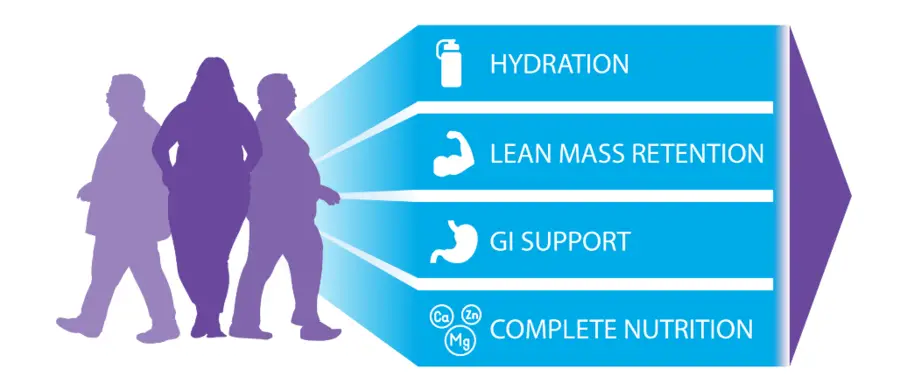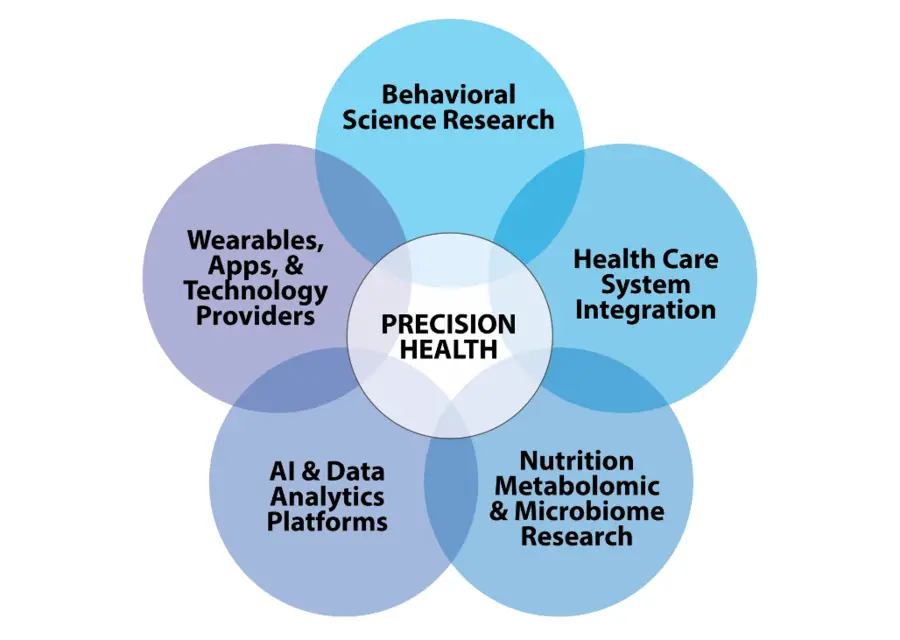Novel obesity drugs are not just appetite suppressants; they are a systemic disruptor, creating precision health opportunities across the food ecosystem
The landscape of nutrition and health has entered a new frontier. Although public attention focuses on the weight-loss results of glucagon-like peptide-1 (GLP-1) medications like Wegovy® and Mounjaro®, these interventions are showcasing precision nutrition as a mainstream approach to health and wellness.
Conversations with industry clients reveal consistent patterns among GLP-1 users: smaller portions that provide satisfaction; reduced cravings for high-fat, high-sugar foods; and requirements for nutrient-dense options that do not trigger gastrointestinal (GI) discomfort. These measurable shifts in consumer behavior, not simply preferences, are creating new market segments.
The intersection of pharmaceutical innovation, consumer behavior change, and technological advancement is creating substantial business opportunities for precision nutrition. For traditional food industry players, new opportunities will arise from transforming existing product portfolios to address the unique challenges posed by shifting consumer behaviors and an evolving marketplace.
How prepared is your research and development (R&D) organization for the consumer behavior, technology, and product innovation shifts that accompany this transformation?
The GLP-1 Phenomenon: Reshaping Food Relationships
GLP-1 receptor agonists represent a new class of obesity medications that work through a series of mechanisms extending far beyond type 2 diabetes and obesity management. These drugs bind to GLP-1 receptors throughout the body, causing a dynamic rewiring of key physiological and neurochemical systems involved in feeding, hunger, satiety, and nutrition.
The result? A new and growing population of consumers who are experiencing fundamental changes in their relationship with food and physiological needs that go beyond traditional nutrition approaches. The physiological changes leading to market opportunities include
- delayed gastric emptying that requires easily digestible, gentle formulations;
- reduced appetite that demands nutrient density in smaller portions;
- altered satiety signals that create needs for complete nutrition in fewer bites;
- GI sensitivities that drive demand for smaller, less spicy meals; and
- changed food preferences that shift toward simpler, cleaner flavors.
These shifts translate directly into opportunities for hydration solutions, lean mass retention support, GI-friendly formulations, and complete nutrition platforms.
From One-Size-Fits-All to Precision Approaches
Unlike traditional nutrition approaches that apply broad dietary guidelines to entire populations, precision nutrition recognizes that optimal health outcomes require individualized strategies. This stratified approach focuses on groups of individuals who share health-related characteristics, like genetic markers, metabolic profiles, microbiome compositions, or medication regimens.
Precision nutrition represents a fundamental shift from the current MyPlate model toward personalized dietary guidance informed by the following:
- Genetic markers that influence nutrient metabolism
- Real-time biometric data from wearables and monitoring devices
- Microbiome composition analysis
- Medication status and physiological state
- Behavior patterns and preferences
- Environmental and lifestyle factors
The trajectory toward widespread adoption of precision nutrition is accelerating, driven by converging trends in biotechnology, data analytics, and consumer demand for personalized health solutions. Traditional product development approaches must evolve to account for specific consumer needs, advanced formulation requirements, and health claim validation through rigorous scientific methods.
The Precision Nutrition Innovation Timeline: From Current State to Future Reality
An analysis of current trends and emerging technologies yields a hypothesized timeline for precision nutrition evolution:
Critical Innovation Areas for Precision Nutrition
The following topics are ripe for innovation amid the emerging shift toward precision nutrition:
- Formulation Science: Products must be redesigned for consumers whose needs, appetites, preferences, and tolerances are changing. This requires both understanding the needs of subsets of the population, as well as how to meet their nutritional needs and appetite preferences through formulation. Additionally, reformulation efforts must anticipate regulatory changes while prioritizing food safety in ingredient substitutions.
- Behavioral Integration: Success requires understanding not just nutritional needs but also evolving eating behaviors. Consumers on obesity medications often experience changes in food timing, social eating patterns, and emotional relationships with food.
- Data-Driven Development: The future belongs to companies that can leverage real-world evidence to inform product development and meet evolving customer needs. This means integrating consumer health data, biometric feedback, and outcome tracking into the innovation process.
- Health Claim Substantiation: As precision nutrition becomes mainstream, regulatory expectations for health claim validation will increase, requiring more sophisticated clinical evidence and safety data. Organizations must also evaluate potential unintended consequences and co-benefits across health, environmental, and economic dimensions.
Strategic Implications for Industry Leaders
The convergence of pharmaceutical innovation, precision medicine, and consumer behavior change creates significant opportunities for food industry leadership. Organizations that successfully connect rigorous science with practical application and align population-level insights to individual needs will gain a competitive advantage in the marketplace. But what capabilities does your organization need to compete in this evolving landscape?
Key strategic considerations include the following:
- Portfolio Realignment: Existing product lines may require reformulation or repositioning to address emerging consumer segments with specific physiological needs, while considering supply chain risks and ingredient sourcing strategies.
- Partnership Strategy: No single organization has all the capabilities required for precision nutrition success. Strategic partnerships spanning health care, technology, and research sectors will be essential. Client engagements demonstrate that organizations building these alliances early are positioning themselves for competitive advantage.
- Regulatory Preparedness: Companies must invest in clinical research to build an evidence base that can support precision nutrition claims that meet regulatory standards.
- Data Integration: Success requires integrating consumer health data, biometric feedback, and real-world evidence into product development and marketing strategies.
- Technology Investment: Precision nutrition demands sophisticated data analytics, AI capabilities, and digital platform integration.
Building the Precision Nutrition Ecosystem
RTI International is helping organizations understand this evolving ecosystem through research insights on the following:
- Health Care Integration: Health care providers increasingly recommend specific food choices based on medication status and health conditions.
- Technology Platforms: Digital health companies need science-backed products to integrate into personalized nutrition plans and coaching programs.
- Data Analytics: Advanced analytical capabilities are required to translate complex biometric and behavioral data into actionable product development insights.
- Clinical Validation: Rigorous research methodologies are needed to substantiate health claims and demonstrate product efficacy across diverse population segments.
RTI occupies a unique position in this ecosystem, combining population health expertise through our coordination of the Centers for Disease Control and Prevention’s National Health and Nutrition Examination Survey, precision medicine research capabilities via the National Institutes of Health’s Nutrition for Precision Health initiative, and comprehensive expertise in behavioral science and advanced data analytics.
The Path Forward for Precision Nutrition Innovation
The GLP-1 revolution represents more than a market opportunity—it signals a fundamental shift in how food, health, and technology intersect. The organizations that recognize this transformation early and build capabilities to address emerging consumer needs will shape the future of nutrition innovation.
RTI's multidisciplinary expertise enables us to support industry partners navigating this complex landscape. From efficacy testing and claim validation to consumer behavior analysis and regulatory strategy, RTI helps guide clients toward informed investment decisions in precision nutrition innovation, translating complex concepts into market-ready solutions.
The question for R&D leaders is not whether precision nutrition will transform the food industry—it is whether their organizations will lead this transformation or follow it. Are you prepared to embrace evidence-based innovation? The precision nutrition revolution has begun, creating substantial opportunities for those ready to act.
Learn more about RTI’s food innovation solutions and sign up for The Growth Brief Newsletter to get insights in your inbox.










